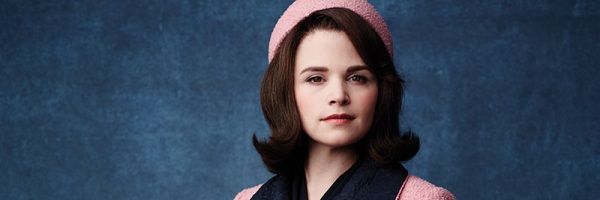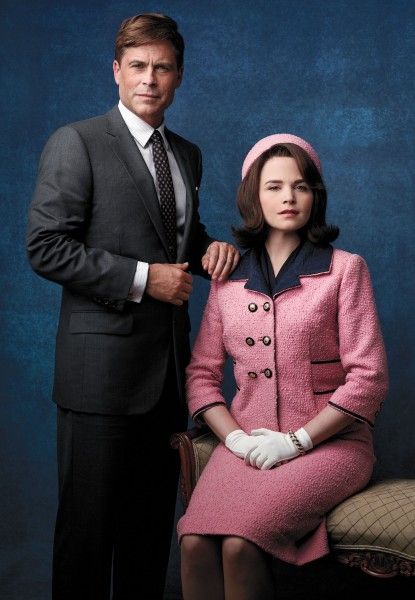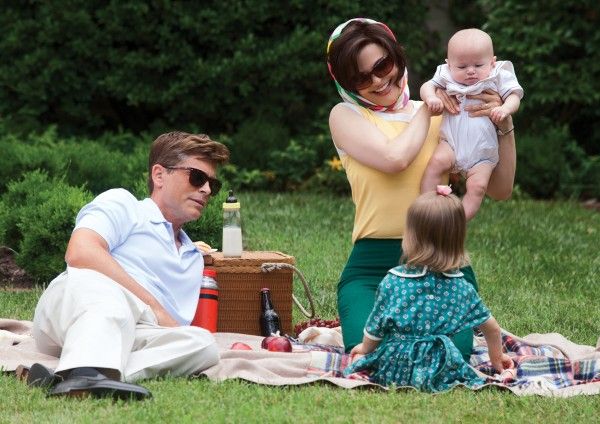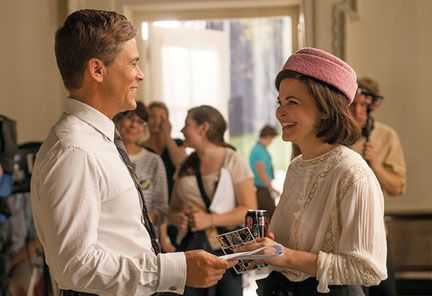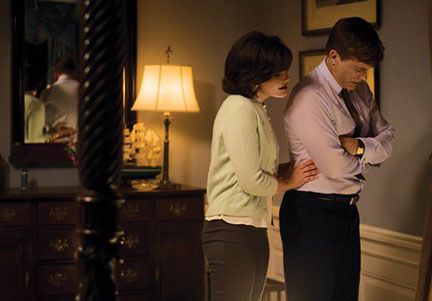Produced by Scott Free Productions and based on the best-selling book by Bill O’Reilly and Martin Dugard, National Geographic Channel’s Killing Kennedy chronicles the build-up to one of America’s most shocking events – the assassination of President John F. Kennedy by Lee Harvey Oswald. In 1959, two men faced major turning points in their lives, one in Washington, D.C., preparing to announce his presidential candidacy, and the other at the U.S. Embassy in Moscow, renouncing his American citizenship. This film charts the highs and lows of those two men, eventually intersecting with two shocking deaths that stunned a nation. It stars Rob Lowe as President John F. Kennedy and Will Rothhaar as Lee Harvey Oswald, with Ginnifer Goodwin as Jacqueline Kennedy and Michelle Trachtenberg as Marina Oswald.
During this recent exclusive phone interview with Collider, actress Ginnifer Goodwin talked about why she’s avoided playing Jackie Kennedy until now, her desire to show the private side of the woman, whether it was more daunting to play part of one of the most famous couples in literature (with Snow White and Prince Charming) or one of the most famous couples in American history (with the Kennedys), what a dream Rob Lowe was to work with, what it was like to see herself in the famous pink suit and hat, and the most emotional moment on set. She also talked about how much she’s enjoyed being a part of her ABC television series Once Upon a Time for the last three seasons. Check out what she had to say after the jump.
Collider: How did this project come about for you? When you were presented with this idea, did you want to run for the hills, or were you intrigued?
GINNIFER GOODWIN: It’s funny because I’ve always run for the hills from the idea of playing Jacqueline Kennedy, in general. It’s not the first Kennedy script I’ve read. It’s not the first time I’ve been asked about Jacqueline. Frankly, I love what the other actresses who have portrayed her on film have done. Not like I could do anything that they had done in the past, but I didn’t know what I could possibly contribute beyond what they had done. Having read scripts about the Kennedys before, and having read everything under the sun, I was cynical when I was sent the package, but I was intrigued of who was involved, in terms of it being Nat Geo and Scott Free. I had heard such incredible things about everyone involved. So, I read the script. I had not yet read Bill O’Reilly’s book, but I was completely captivated by the material. I felt that this was a version of the story we hadn’t ever seen before.
Once you did sign on and you were committed to playing this role, what were you most nervous about?
GOODWIN: At first, I was overwhelmed by the pressure of playing her, but after an excessive amount of research and homework, working with a coach, and studying and making choices, just before we began filming, (director) Nelson McCormick said something to me that we should all ask ourselves, every time we take on a role. He said, “Each of us has to decide, why this? Why do we, individually, want to be a part of this storytelling? What is it that we are bringing to it?” Having someone articulate it in that way, I realized that I just needed to be asked the question simply and clearly. And then, I could say, “What I want to do is show the completely and utterly private side of this woman that no one has ever seen.” That’s the only side of this woman that’s explored in this script. What makes it unusual and the reason I wanted to tackle it is that we don’t know what happens behind closed doors. Especially those of us in the public eye, we all have a public side of us and we all have a private side of us that we keep very safe. I wanted to find her safe place. That idea relieved a lot of pressure because I realized that I didn’t want to do an impression or an impersonation of her. No one would believe it. I didn’t even want to look exactly like her. I didn’t want to alter my face so much that I was unrecognizable because then people would be studying me on screen and saying, “What is it that she did differently?” I didn’t want people to be taken out of the story, in any way. I decided that I wanted to imply her. I wanted to find her authenticity. I wanted to show the side of her that we don’t know, and that no one’s ever really tackled before. I wanted to take her away from the more dramatic broadstrokes of the politics and the philandering and the things we usually define her by, and I wanted to play her the way she described herself. And that opened up a world of possibilities.
Especially with the 50th anniversary of the assassination, there is no shortage of people who will try to exploit such a terrible day in American history. Was it important to you that this film chose one viewpoint, as far as who was responsible, and that it wasn’t a story of speculation?
GOODWIN: Oh, my gosh, absolutely! I felt that because it wasn’t a story about a conspiracy, I could proudly be a part of it. Conspiracies are just that. They are speculation, and they’re dramatic and glamorous. What this is, is a story that’s mostly about four human beings and what made them human beings. I can’t imagine anyone else is going to tackle this subject matter, in that way.
Were you surprised to see the parallels in this story, between the Kennedys and the Oswalds?
GOODWIN: Yeah. That’s a testament to the screenwriter. The book, which I adore and find incredible, is mostly about the Kennedys. I really appreciated that so much focus was put on the Oswalds, and on the parallels and the juxtaposition of these couples.
You’ve gone from playing part of one of the most famous couples in literature, with Snow White and Prince Charming, to playing part of one of the most famous couples in American history, with JFK and Jackie. Were they equally daunting?
GOODWIN: It’s going from Camelot to Camelot. They’re daunting in different ways. It’s funny to me that almost every role I’ve ever played is based on source material. It’s based on literature, life rights or self-help books. So, I frequently have things from which to draw, which I really, really appreciate, coming from theater. I would say that they’re different kinds of challenges. There’s a little more liberty with Snow White, in some ways, but that makes it harder because I have to find a way to justify the things that have been written about that character and stay true to the legend of Snow White, and yet create. It’s been an interesting conundrum, being part of a show that’s the ultimate fan fiction, and having to stay tethered, at the same time, to rather concrete storytelling. And then, in playing Jacqueline Kennedy, I tried to find a way to express her, imply her, and find the essence and authenticity of her without mimicking her, and yet I was also up against everyone’s preconceived notions of who she was. All of that was incredibly complicated. But there was a freedom in the fact that the story that we were telling is the story of what happened behind closed doors. In that way, I was really free to play. I based her on the things she said about herself, which were things that were vastly different from how other people described her. Anything can really happen behind closed doors.
What was it like to have Rob Lowe to work with on this, with as passionate as he is about the Kennedys and how dedicated he was to bringing this man to life in such a respectful way?
GOODWIN: He’s something of a scholar, and he is a dream of a scene partner. I found that because he’s so confident, and yet humble and generous, and because he’s so incredibly committed and dives in head first, it really made me feel very safe to go as far as I could go. He also just lifted me up, all the time, and empowered me to really, really, really go for it. I couldn’t have asked for a better playmate.
What was it like to actually put on the pink suit and hat, and to see what you looked like in it?
GOODWIN: It was completely and utterly jarring. At the same time, what I was attached to was the idea that this actually was Jack’s favorite outfit of hers. I find that fascinating. I understand why she did not take it off for 24 hours after the assassination, on many different levels. So, I tried to focus on that positive relationship with the outfit. I couldn’t, as an actress, think about it as a costume and as the outfit she wore when this tragedy occurred. I had to focus on it as Jack’s favorite outfit.
Were there moments on set when you got particularly emotional?
GOODWIN: What’s interesting is that what I thought would be the most discombobulating was actually the least discombobulating. What I thought was the most benign moment was the most emotional for me. We filmed the assassination, so that they could intersperse clips of us with the documentary footage. And in the moment, I realized that, though my instinct as an actress would be to try to connect emotionally, in reality, Jacqueline was in such shock. Because she had no idea what had happened, what was going on, why that sound was, why her husband was making this face and why her husband was reaching for his throat, there wasn’t time to be emotional. The emotion came afterwards, in the car when she realized what happened. There wasn’t time during that scene to take in what was happening, and it was hard to just play nothing, in that way. It’s hard to play limbo, and I thought that scene would have been the most emotional for me. But what killed me was what was, in the script, the last scene of the film, with Jacqueline thanking the nation. It was a melding of a real interview she did, called “Jackie thanks the nation.” It was months later, and it was her first public interview. She addressed the world and thanked them for their outpouring of love in their letters. And doing that scene and just talking about who JFK was, very simply, and what that loss was for her, really, really, really slayed me, while we were rolling. I was expecting to be so overcome with emotion, with such an epilogue of a scene. I wasn’t expecting that scene to be so discombobulating.
Do you feel like you have an understanding of her now that you never could have had before?
GOODWIN: I do. All of my preconceived notions of her, I feel like were wrong. I don’t know if this will be met with any adversity, in any way, but because all of us have always seen her as strong, independent, feminine and modern, in a 2013 sense, I was really shocked to learn that she saw herself as very Victorian and that she dedicated her life to being the kind of wife that Jack wanted her to be. She said things like, “Why would I have an opinion when Jack’s going to have an opinion that will surely be better than mine?” She always made sure that she was physically lower than him, especially in photographs. Her life was all about being devoted to him. I was shocked that those were the ways that she described herself. Had I not done the amount of research I’d done, and come up against walls and had to ask myself questions like, “Why am I doing this?,” I never would have dug so deep as to study why someone like her, who was such an icon and a representative of so much, saw herself so differently. I don’t think I ever would have come across that information. I never would have sought it out. It’s not the stuff that’s been perpetuated about her and cycled back through the press. The things that she said about herself, because it’s not what we want her to have been, are not the things that people talk about her having been. So, I do feel like I know her intimately, at least in the way she wanted to be known. I totally think I could teach a college level course about it.
After being in the third season of Once Upon a Time, are you surprised with how much you’re still learning about both sides of your character? Does it feel like you keep learning new things about her, every season?
GOODWIN: Oh, sure! That’s why I love and prefer television to movie-making. There’s so much room to grow, and you really get to dig your elbows in and change with a character because people change and people grow. I sign on to things based on the writing, and I knew that this pilot was an incredible platform and an incredible jumping-off place and that there was so much potential. I’m infinitely surprised by how much I learn and how much room they give me to play, and to grow and change. That’s why I do television. It’s definitely a playground for the imagination.
Killing Kennedy airs on National Geographic on November 10th. Once Upon a Time airs on Sunday nights on ABC.

